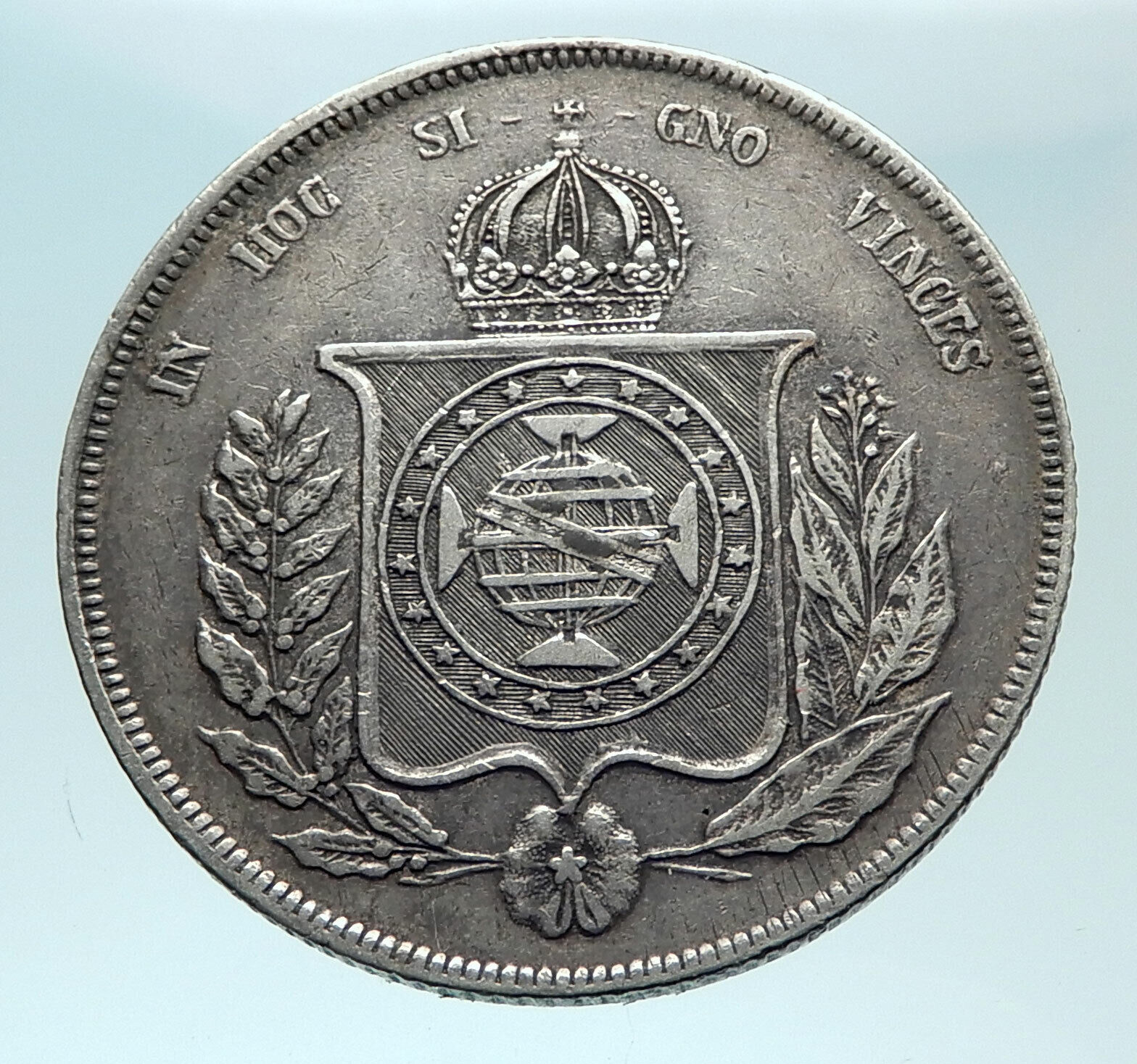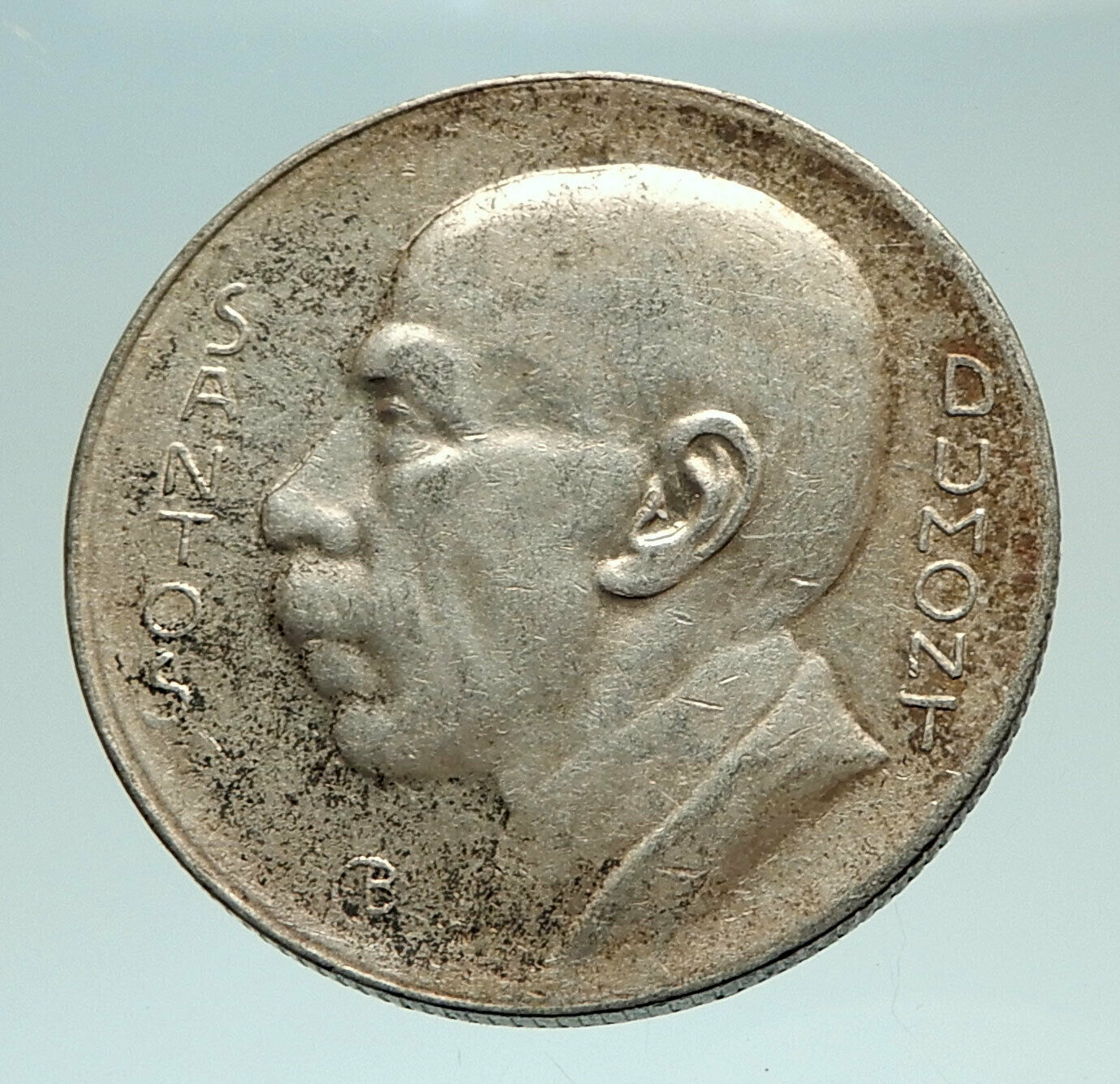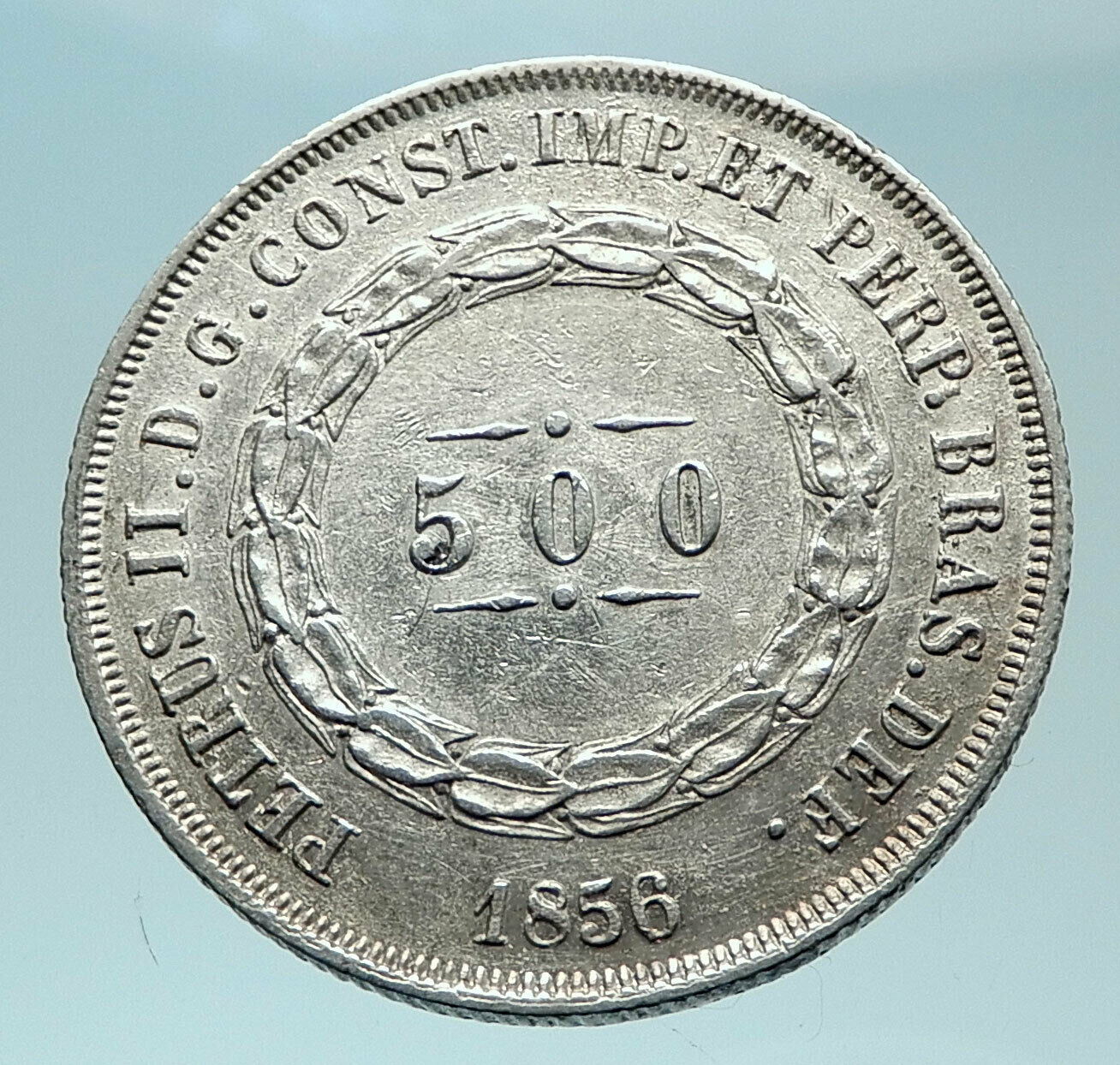|
Brazil
1935 Silver 2000 Reis 25mm (7.95 grams) 0.500 Silver (0.1286 oz. ASW)
Reference: KM# 535
2000 Réis Brasil W.T., Sword between value.
CAXIAS, Head of Marshall Luiz Alves de Lima, Duke of Caxias (1803-1880) facing left.
You are bidding on the exact item pictured, provided with a Certificate of Authenticity and Lifetime Guarantee of Authenticity.
Click here to see all coins of Brazil available for sale in my store
 Luís Alves de Lima e Silva, Duke of Caxias (25 August 1803 – 7 May 1880), nicknamed “the Peacemaker” and “Iron Duke”, was an army officer, politician and monarchist of the Empire of Brazil. Like his father and uncles, Caxias pursued a military career. In 1823 he fought as a young officer in the Brazilian War for Independence against Portugal, then spent three years in Brazil’s southernmost province, Cisplatina, as the government unsuccessfully resisted that province’s secession in the Cisplatine War. Though his own father and uncles renounced Emperor Dom Pedro I during the protests of 1831, Caxias remained loyal. Pedro I abdicated in favor of his young son Dom Pedro II, whom Caxias instructed in swordsmanship and horsemanship and eventually befriended. Luís Alves de Lima e Silva, Duke of Caxias (25 August 1803 – 7 May 1880), nicknamed “the Peacemaker” and “Iron Duke”, was an army officer, politician and monarchist of the Empire of Brazil. Like his father and uncles, Caxias pursued a military career. In 1823 he fought as a young officer in the Brazilian War for Independence against Portugal, then spent three years in Brazil’s southernmost province, Cisplatina, as the government unsuccessfully resisted that province’s secession in the Cisplatine War. Though his own father and uncles renounced Emperor Dom Pedro I during the protests of 1831, Caxias remained loyal. Pedro I abdicated in favor of his young son Dom Pedro II, whom Caxias instructed in swordsmanship and horsemanship and eventually befriended.
During Pedro II’s minority the governing regency faced countless rebellions throughout the country. Again breaking with his father and other relatives sympathetic to the rebels, from 1839 to 1845 Caxias commanded loyalist forces suppressing such uprisings as the Balaiada, the Liberal rebellions of 1842 and the Ragamuffin War. In 1851, under his command, the Brazilian army prevailed against the Argentine Confederation in the Platine War; a decade later Caxias, as army marshal (the army’s highest rank), led Brazilian forces to victory in the Paraguayan War. As a reward he was raised to the titled nobility, becoming successively a baron, count, and marquis, finally becoming the only person created duke during Pedro II’s 58-year reign.
In the early 1840s Caxias became a member of the Reactionary Party, which evolved into the Party of Order and finally the Conservative Party. He was elected senator in 1846. The Emperor appointed him president of the Council of Ministers (prime minister) in 1856; he briefly held that office again in 1861, but fell when his party lost its parliamentary majority. Over the decades Caxias witnessed the growth and zenith of his party, then its slow decline as internal conflict divided it. In 1875, he headed a cabinet for the last time, and after years of failing health he died in May 1880.
In the years after his death and mainly following the downfall of the Brazilian monarchy, Caxias’ reputation was initially overshadowed by that of Manuel Luís Osório, Marquis of Erval, but with time surpassed even Erval’s renown. In 1925 his birthday was established as the Day of the Soldier, a day of honor for the Brazilian army. On 13 March 1962 he was officially designated the army’s protector-its soldierly ideal and the most important figure in its tradition. Historians have regarded Caxias positively, several ranking him as the greatest of Brazil’s military officers.
.svg/250px-Brazil_(orthographic_projection).svg.png)  Brazil, officially the Federative Republic of Brazil, is the largest country in both South America and Latin America. As the world’s fifth-largest country by both area and population, it is the largest country to have Portuguese as an official language-and the only one in the Americas. Brazil, officially the Federative Republic of Brazil, is the largest country in both South America and Latin America. As the world’s fifth-largest country by both area and population, it is the largest country to have Portuguese as an official language-and the only one in the Americas.
 Bounded by the Atlantic Ocean on the east, Brazil has a coastline of 7,491 km (4,655 mi). It borders all other South American countries except Ecuador and Chile and covers 47.3% of the continent’s land area. Its Amazon River basin includes a vast tropical forest, home to diverse wildlife, a variety of ecological systems, and extensive natural resources spanning numerous protected habitats. This unique environmental heritage makes Brazil one of 17 megadiverse countries, and is the subject of significant global interest and debate regarding deforestation and environmental protection. Bounded by the Atlantic Ocean on the east, Brazil has a coastline of 7,491 km (4,655 mi). It borders all other South American countries except Ecuador and Chile and covers 47.3% of the continent’s land area. Its Amazon River basin includes a vast tropical forest, home to diverse wildlife, a variety of ecological systems, and extensive natural resources spanning numerous protected habitats. This unique environmental heritage makes Brazil one of 17 megadiverse countries, and is the subject of significant global interest and debate regarding deforestation and environmental protection.
Brazil was inhabited by numerous tribal nations prior to the landing in 1500 of explorer Pedro Álvares Cabral, who claimed the area for the Portuguese Empire. Brazil remained a Portuguese colony until 1808, when the capital of the empire was transferred from Lisbon to Rio de Janeiro. In 1815, the colony was elevated to the rank of kingdom upon the formation of the United Kingdom of Portugal, Brazil and the Algarves. Independence was achieved in 1822 with the creation of the Empire of Brazil, a unitary state governed under a constitutional monarchy and a parliamentary system. The ratification of the first constitution in 1824 led to the formation of a bicameral legislature, now called the National Congress. The country became a presidential republic in 1889 following a military coup d’état. An authoritarian military junta came to power in 1964 and ruled until 1985, after which civilian governance resumed. Brazil’s current constitution, formulated in 1988, defines it as a democratic federal republic. The federation is composed of the union of the Federal District, the 26 states, and the 5,570 municipalities.
Brazil’s economy is the world’s ninth-largest by nominal GDP and seventh-largest by GDP (PPP) as of 2015. A member of the BRICS group, Brazil until 2010 had one of the world’s fastest growing major economies, with its economic reforms giving the country new international recognition and influence. Brazil’s national development bank plays an important role for the country’s economic growth. Brazil is a founding member of the United Nations, the G20, BRICS, Unasul, Mercosul, Organization of American States, Organization of Ibero-American States, CPLP, and the Latin Union. Brazil is a regional power in Latin America and a middle power in international affairs, with some analysts identifying it as an emerging global power. One of the world’s major breadbaskets, Brazil has been the largest producer of coffee for the last 150 years.
|




 Luís Alves de Lima e Silva, Duke of Caxias (25 August 1803 – 7 May 1880), nicknamed “the Peacemaker” and “Iron Duke”, was an army officer, politician and monarchist of the Empire of Brazil. Like his father and uncles, Caxias pursued a military career. In 1823 he fought as a young officer in the Brazilian War for Independence against Portugal, then spent three years in Brazil’s southernmost province, Cisplatina, as the government unsuccessfully resisted that province’s secession in the Cisplatine War. Though his own father and uncles renounced Emperor Dom Pedro I during the protests of 1831, Caxias remained loyal. Pedro I abdicated in favor of his young son Dom Pedro II, whom Caxias instructed in swordsmanship and horsemanship and eventually befriended.
Luís Alves de Lima e Silva, Duke of Caxias (25 August 1803 – 7 May 1880), nicknamed “the Peacemaker” and “Iron Duke”, was an army officer, politician and monarchist of the Empire of Brazil. Like his father and uncles, Caxias pursued a military career. In 1823 he fought as a young officer in the Brazilian War for Independence against Portugal, then spent three years in Brazil’s southernmost province, Cisplatina, as the government unsuccessfully resisted that province’s secession in the Cisplatine War. Though his own father and uncles renounced Emperor Dom Pedro I during the protests of 1831, Caxias remained loyal. Pedro I abdicated in favor of his young son Dom Pedro II, whom Caxias instructed in swordsmanship and horsemanship and eventually befriended. .svg/250px-Brazil_(orthographic_projection).svg.png)
 Brazil, officially the Federative Republic of Brazil, is the largest country in both South America and Latin America. As the world’s fifth-largest country by both area and population, it is the largest country to have Portuguese as an official language-and the only one in the Americas.
Brazil, officially the Federative Republic of Brazil, is the largest country in both South America and Latin America. As the world’s fifth-largest country by both area and population, it is the largest country to have Portuguese as an official language-and the only one in the Americas. Bounded by the Atlantic Ocean on the east, Brazil has a coastline of 7,491 km (4,655 mi). It borders all other South American countries except Ecuador and Chile and covers 47.3% of the continent’s land area. Its Amazon River basin includes a vast tropical forest, home to diverse wildlife, a variety of ecological systems, and extensive natural resources spanning numerous protected habitats. This unique environmental heritage makes Brazil one of 17 megadiverse countries, and is the subject of significant global interest and debate regarding deforestation and environmental protection.
Bounded by the Atlantic Ocean on the east, Brazil has a coastline of 7,491 km (4,655 mi). It borders all other South American countries except Ecuador and Chile and covers 47.3% of the continent’s land area. Its Amazon River basin includes a vast tropical forest, home to diverse wildlife, a variety of ecological systems, and extensive natural resources spanning numerous protected habitats. This unique environmental heritage makes Brazil one of 17 megadiverse countries, and is the subject of significant global interest and debate regarding deforestation and environmental protection.




